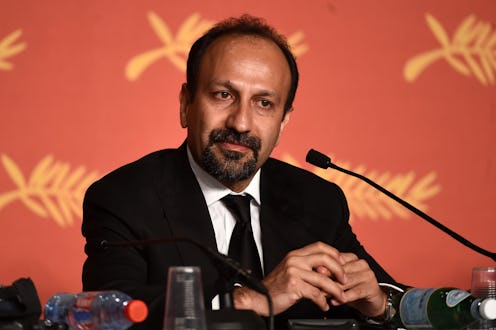Entertainment
Will The Muslim Ban Affect This Year's Oscars?

This week, President Trump issued an executive order temporarily banning entry to the U.S. for refugees and immigrants from seven Muslim-majority countries. While this comes with a whole heap of potentially disturbing consequences, it appears this could also work against America's entertainment industry — so will the "Muslim ban" affect the Oscars? There have been claims circulating that Iranian director Asghar Farhadi reportedly “won’t be let into” the U.S. for the Oscars ceremony. The filmmaker, who wrote and directed The Salesman, was due to appear at next month's award ceremony for his nomination in the Best Foreign Language Film category.
Update: An Academy spokesperson released the following statement to Bustle:
"The Academy celebrates achievement in the art of filmmaking, which seeks to transcend borders and speak to audiences around the world, regardless of national, ethnic, or religious differences. As supporters of filmmakers—and the human rights of all people—around the globe, we find it extremely troubling that Asghar Farhadi, the director of the Oscar-winning film from Iran A Separation, along with the cast and crew of this year's Oscar-nominated film The Salesman, could be barred from entering the country because of their religion or country of origin."
Earlier: Given the fact that Trump's "Muslim ban" has barred citizens from Iran, Iraq, Yemen, Sudan, Somalia, and Libya from entering the U.S. for at least 90 days (and banning Syrian refugees from entering the country for an undisclosed period of time), this may affect whether Farhadi is able to attend the ceremony. The Academy Awards will be held in Los Angeles on Feb. 26, which falls within the three-month ban period. Reports state that even citizens from those countries who already have visas to enter America are now being blocked from boarding U.S. flights. The New York Times has also highlighted the almost immediate aftermath of the travel ban.
Trita Parsi of the National Iranian American Council first tweeted about Farhadi potentially being banned from traveling. While Parsi wrote the news was confirmed, Bustle reached out to Farhadi's reps, as well as the Academy, for comment and clarification, but has not received a response at the time of publication.
Meanwhile, the Tribeca Film Festival tweeted in protest of the claim:
"Oscar nominee Asghar Farhadi has been banned from entry into the U.S. to attend the ceremony in Feb. This is heartbreaking and unacceptable."
This follows hot on the heels of one of the lead actors of The Salesman, Taraneh Alidoosti announcing she was boycotting the Oscars, because of Trump's "Muslim ban."
For the record, this isn't the first time Farhadi has found success at the Oscars. In 2012, his film A Separation won the award for Best Foreign Language Film and this was a landmark moment: It became the first Iranian movie to win the category. In his acceptance speech, which now feels doubly poignant to hear, he described the hope his movie winning provided in "a time of talk of war, intimidation" and when "aggression is exchanged between politicians."
Whether or not Farhadi is able to travel, the discussion indicates the very real consequences that could arise from this ban. While the possibility that Farhadi can't attend the Oscars has people talking presumably because it's related to America's most glamorous industry, Hollywood, the ban still poses a problem for plenty of people who don't have as big of a platform as Farhadi. Perhaps one positive thing, the only positive thing, about this troubling story is that it sheds a spotlight on these people, too.